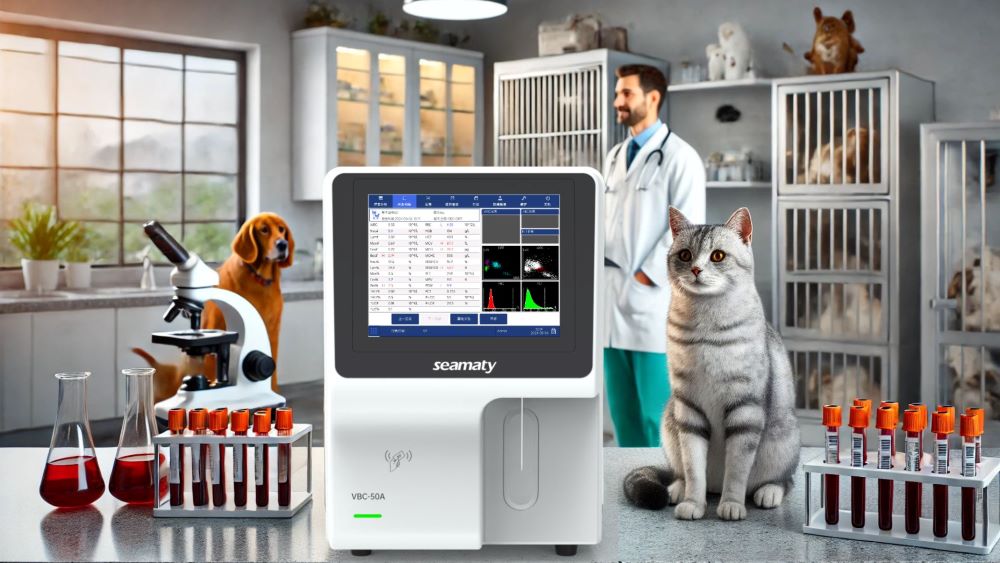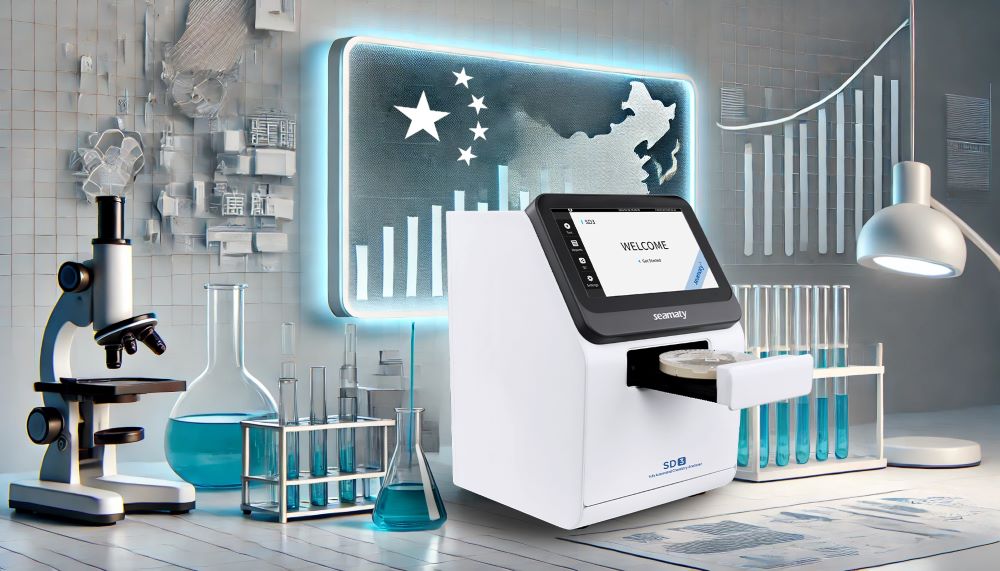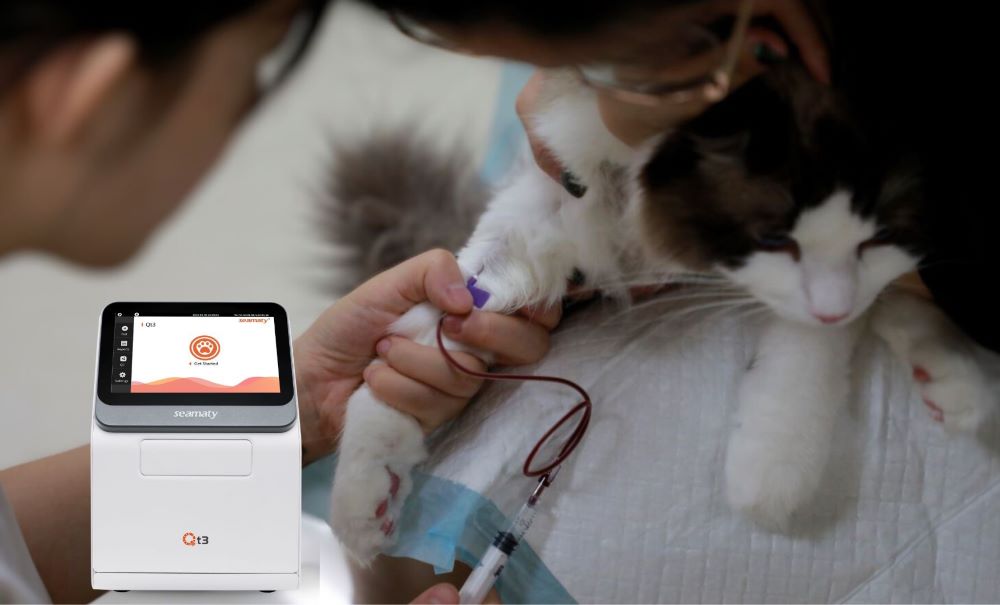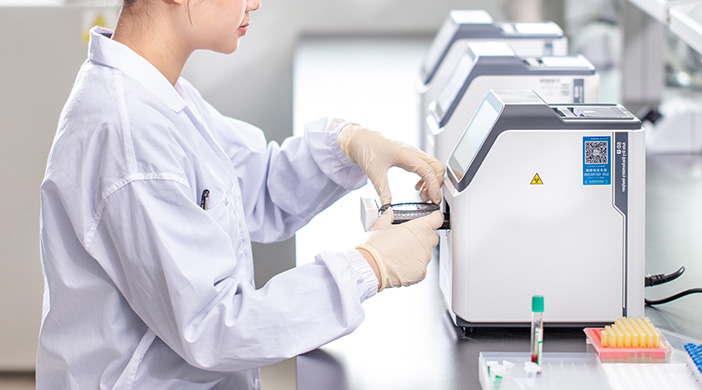release time:2024-10-22 15:13:20

As veterinary practices strive to provide the best possible care for their patients, the need for fast, reliable, and cost-effective diagnostic tools has never been greater. Seamaty, a leading provider of point-of-care testing (POCT) solutions, offers a range of innovative products designed to meet the demands of modern veterinary clinics. Among these is the Seamaty VBC50A, a 5-part automatic veterinary hematology analyzer that is revolutionizing blood diagnostics.
In this post, we explore five key ways the Seamaty VBC50A is enhancing diagnostic capabilities for veterinarians.
Veterinary clinics often face space constraints, especially in urban areas or mobile settings. The Seamaty VBC50A is designed with this in mind. Its compact size makes it easy to integrate into clinics of all sizes without taking up too much space.
In addition to its physical advantages, the VBC50A features a 10.4-inch touch screen that simplifies navigation. The colorful liquid crystal display, with a resolution of 800x600, ensures that even the smallest details are clearly visible. The screen’s 10° incline is specifically designed to enhance visibility, allowing users to comfortably observe test results.
This combination of compact design and intuitive interface ensures that the VBC50A is both easy to use and practical for busy veterinary professionals.
Veterinary diagnostics can become costly, especially when repeated tests are necessary. One of the standout features of the VBC50A is its ability to reduce both sample volume and reagent consumption. The analyzer requires only 20uL of whole blood to run a test, making it ideal for small animals like cats and rabbits, as well as animals in critical condition where drawing large blood samples can be difficult.
Additionally, the VBC50A operates with only three reagents, reducing the need for costly consumables. This lower reagent usage helps veterinary clinics keep operational costs down while still providing accurate and comprehensive results. By minimizing both sample and reagent requirements, the VBC50A allows clinics to offer high-quality diagnostics at a fraction of the cost of external lab tests.
The Seamaty VBC50A isn’t just versatile in its design—it’s also highly adaptable to a wide range of animals. It supports 13 different species, including dogs, cats, horses, rats, mice, and even livestock like cows, sheep, and pigs. The analyzer also includes 3 customizable settings for less common species, allowing clinics to adjust testing protocols for their specific needs.
When it comes to blood diagnostics, the VBC50A covers an extensive range of 29 parameters, including 25 reportable and 4 research parameters. These parameters encompass crucial measurements like white blood cell count (WBC), red blood cell count (RBC), hemoglobin, hematocrit, and more. The machine also provides detailed 2 histograms and 2 scattergrams, offering veterinarians deeper insights into cell distribution and morphology.
This comprehensive analysis gives veterinarians the ability to quickly and accurately diagnose a variety of conditions, from anemia and infections to inflammatory diseases, all with a single blood test.
Time is of the essence when diagnosing and treating animals, especially in emergency situations. The Seamaty VBC50A provides results in less than 5 minutes, allowing veterinarians to make fast, informed decisions about treatment.
The analyzer’s advanced technology includes both histograms and scattergrams, offering visual representations of blood cell distribution that can help detect abnormalities or changes in cell morphology. This is particularly useful in diagnosing conditions such as infections, inflammation, or blood disorders.
With its rapid processing time and advanced features, the VBC50A significantly improves the workflow in veterinary clinics, helping to ensure better outcomes for patients.
One of the major concerns for any diagnostic equipment is ongoing maintenance. The Seamaty VBC50A simplifies this with its automated cleaning system, which cleans sample probes and tubes after each test, ensuring the machine remains hygienic and ready for the next use.
The analyzer also features automated fault processing, which minimizes downtime by quickly identifying and addressing operational issues. These user-friendly maintenance features reduce the burden on clinic staff and ensure that the VBC50A continues to operate at peak efficiency with minimal manual intervention.
The Seamaty VBC50A offers a comprehensive, cost-effective, and user-friendly solution for veterinary blood diagnostics. Its compact design, low sample and reagent consumption, multi-species compatibility, fast results, and maintenance-friendly features make it an essential tool for any veterinary practice.
Whether you run a small clinic or a large animal hospital, the VBC50A can enhance your diagnostic capabilities, improve patient outcomes, and reduce overall costs. If you’re ready to take your veterinary diagnostics to the next level, contact Seamaty today to learn more about the VBC50A or schedule a demo.
Recommended further reading:
1. Optimizing Veterinary Blood Tests: A Guide to Veterinary Hematology Analyzers
2. Veterinary Hematology Analyzer: Introduction, Advantages, Types
3. 5 Reasons Why Your Clinic Needs Seamaty Veterinary Hematology Analyzers
4. Why Seamaty's Automated Hematology Analyzers are the Best Choice for Your Medical Practice
5.Top 6 Veterinary Hematology Analyzers for Animal Hospitals in 2024
6. Veterinary Hematology Analyzer Showdown: Seamaty VBC50 vs. IDEXX ProCyte Dx

2024-11-14
Discover the benefits of choosing a Chinese-made chemistry analyzer for your lab. Learn how brands like Seamaty offer high-quality performance, advanced technology, customization options, and cost savings, making them a smart choice for healthcare providers worldwide.

2024-08-28
Discover why your vet clinic needs a Veterinary Blood Chemistry Analyzer. Learn how the Seamaty Qt3's advanced microfluidic technology, accurate results, and easy-to-use design can enhance your clinic’s diagnostics, improve patient outcomes, and boost efficiency.

2022-05-17
A simple formula to describe POCT devices is "Point-of-care diagnostic products = fast + accurate + small instruments". most point of care testing devices have undergone a process of gradual simplification and improvement from traditional testing methods to achieve convenient and rapid on-site examination at the patient's side for the purpose of rapid diagnosis.